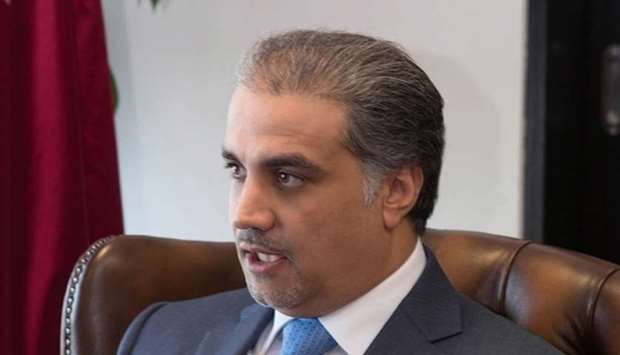Qatar's ambassador to Greece, Abdulaziz Ali al-Naama, has affirmed the continuous development of Doha-Athens relations, and the great economic growth witnessed as a result of the establishment of a Qatari-Greek business council specialised in the private sector to activate investment between the two countries.
In an interview with the News Agency of Greece, ambassador al-Naama said that the Greek-Qatari relations are in a state of continuous development thanks to the constant communication between officials of the two countries and exchange of official visits by high-level delegations.
He referred in this context
to Qatar's keenness in investing in Greece, saying: "The State of Qatar has a prominent interest in the field of investment and growing activity at the regional and international levels", noting that Qatar raises the ceiling of its interest in the investment movement in Greece based on special agreements in the field of investment between the two sides. He highlighted in this regard the establishment of a Qatari-Greek business council specialised in the private sector to activate investment.
He said that Qatar had dealt with the Covid-19 in multiple ways, which include: community awareness, checking, providing sufficient beds to receive infected cases and allocating a number of hospitals to treat those infected with the disease.
Ambassador al-Naama added that Qatar had made global co-operation and solidarity key to confronting the pandemic, by providing humanitarian assistance to many friendly countries, including: Lebanon, Iran, Albania, Palestine, Congo, Angola, China, Nepal, the United States, Italy, Rwanda and Somalia, besides others, believing in the importance of supporting brotherly and friendly countries in combating the virus.
He said that Qatar, based on its conviction is ensuring the health and safety for all citizens and residents, co-ordinating and facilitating the response, and providing assistance to countries in need to combat the pandemic as a top priority, has repeatedly called for the need for international co-operation to overcome this ordeal.
On the blockade imposed on Qatar, the ambassador stressed that Doha had succeeded in overcoming the unjust blockade and getting out of its negative effects, adding that the Qatari people turned the challenge into an incentive to achieve more political, diplomatic, economic and industrial progress.
He pointed out that Qatar, since the beginning of the Gulf crisis, had called for dialogue and respected the principle of reciprocity, and did not expel any of the citizens of the blockading countries, or dispersed any Gulf family.
Regarding the agreement concluded between the United States and the Taliban in Doha, ambassador al-Naama said that this agreement, which was sponsored by Qatar, is of great importance, describing it as a "historic achievement" that contributes to peace in the region and enhances hope for ending the war that has been going on in Afghanistan for nearly 18 years and was the longest United States foreign wars.
On expectations of Qatar organising and hosting the 2022 World Cup, the ambassador confirmed that Qatar had become a sports hub by hosting the 2022 World Cup, and it welcomes all those coming to attend the World Cup, which will be held for the first time in the region, noting that the ongoing preparations for hosting it are in full swing and "fans and visitors will have an unparalleled experience," and stressing that Qatar promises the world a unique edition of the World Cup.
On accusations levelled at Qatar about the workers' rights, ambassador al-Naama said that Qatar pays great attention to the workers' rights within the framework of promoting and guaranteeing human rights in the country through the issuance of the law of permanent residence of foreign workers, and the amendment of the law on the entry and exit of expatriates and their residence, besides issuing a law establishing a fund to support and secure expats, as well as the labour dispute resolution committees in the country.
He added that Qatar had recently implemented comprehensive reforms with regard to labour laws and regulations to consolidate basic rights in the field of work, considering that Qatar places the rights of all migrant workers at the centre of its economic and social policies, stressing the need for any dialogue with the Qatari government to protect workers and their rights to be purposeful and away from any special agendas and gains.

